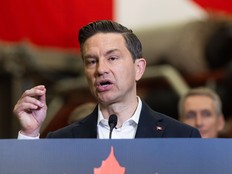O'TOOLE: A Remembrance Day reflection for Wing Commander Byron Rawson

Article content
As we gather this Remembrance Day, we are called not just to remember those who served, but to reflect deeply on their sacrifices — the triumphs, heartbreaks, and, too often, the unseen burdens that haunt our veterans long after the last mission ends.
Among these stories is that of Wing Commander Byron Rawson, a young aviator whose remarkable service and silent suffering embody the quiet heroism and immense cost borne by generations of Canadian servicemen and women.
Rawson was a man of conviction, raised with a deep sense of duty. During the Second World War, he set aside his dreams of practicing law to join the Royal Canadian Air Force (RCAF) at a time when his country needed him most. He quickly rose through the ranks, becoming a Pathfinder pilot in Bomber Command — a role demanding exceptional skill and courage, guiding bombing raids over hostile territory to strike precisely at enemy targets. The Pathfinders were the first to fly into danger, illuminating targets for their comrades. It was a role that came with great responsibility, and Byron took it on knowing full well the risks involved.
The burdens of his duty were more than just physical. His missions required navigating complex moral terrain. Bomber Command, though instrumental in the Allied victory, carried out bombing raids that resulted in civilian casualties — a reality that weighed heavily on Byron and his fellow airmen. He knew that each flight carried a toll, not only in enemy territory but within his own heart. Yet he persisted, flying not one but two full tours, and exceeding the 50-mission cap for pilots. For this, he was awarded the Distinguished Flying Cross — twice — and promoted to Wing Commander by the age of 21.
When Rawson returned home, the visible accolades didn’t erase the invisible scars. Friends and family noticed a change; he was haunted by the devastation he had witnessed. Despite outward signs of adjustment, his internal battles raged on. That first Christmas back, he took his own life in his parents’ home. His family’s grief was compounded by a system that, at the time, didn’t recognize his suffering as a service-related death. For over seven decades, his sacrifice went unacknowledged by the country he served so faithfully.
Thanks to tireless advocates, including Toronto-based lawyer Patrick Shea, Rawson’s story was finally recognized in 2018. The Commonwealth War Graves Commission now officially acknowledges that his death resulted from his service. Today, a veteran’s marker adorns his grave, a symbol of the honour he deserved. His story is no longer forgotten, and his name is enshrined in Canada’s Book of Remembrance — reflecting his courage and the unseen costs he bore.
Rawson’s story reminds us of our duty to remember fully, to honour not only the victories but the scars of service, visible and invisible. There should be no limitation period on recognizing heroism and the exceptional conduct of our citizens. It is never too late to do the right thing and recognize the tremendous contributions of our servicemen and women.
This Remembrance Day, let us commit to honouring their legacy by understanding their sacrifices and supporting those who carry them.
— Erin O’Toole is President of ADIT North America and former Leader of the Conservative Party of Canada.














Postmedia is committed to maintaining a lively but civil forum for discussion. Please keep comments relevant and respectful. Comments may take up to an hour to appear on the site. You will receive an email if there is a reply to your comment, an update to a thread you follow or if a user you follow comments. Visit our Community Guidelines for more information.